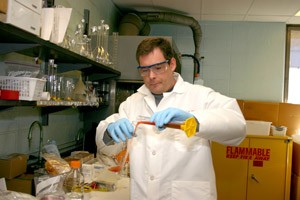
UC Chemistry Research Looks to Turn Food Waste into Fuel
Three
undergraduate researchers recently spent time at the Ho Chi Minh City (HCMC) University of Science, in Vietnam, working on ways to turn food waste into biodiesel fuel. Cody Nubel, Megan McCallister and Zachary Herrmann joined Professor Allan Pinhas and graduate researchers, Amos Doepke and Chau Phung, on a joint research project with Lawrence Pratt of Fisk University.
The project, Biodiesel Fuel from Food Waste, focuses on the potential to produce biodiesel from oil extracted from garbage. With the depletion of oil reserves, research into alternative fuels has exploded, especially in the area of renewable resources such as garbage and food waste. One particular resource, brown grease from food waste, has yet to realize its full potential, but thanks to the efforts of
chemistry researchers, the project is finding ways to optimize this resource.
One of the goals of the project was to determine the amount of usable oil that can be obtained from food waste. To do this, the researchers collected food wasteby hand from an HCMC University of Science student canteen as well as a private residence. Samples of the food waste were then either sun-dried or dried in an ovena process Nubel describes as extremely dirty and smellyand then ground up and loaded into a homemade extraction thimble bag so that oils contained in the food could be extracted through a Soxhlet extraction.

Food waste was sun-dried for extraction purposes.
It was during the extraction process that Nubel made an important discovery. During this step I determined a much more efficient way of pulling remnants of oil from the bag by using the suction formed from the extractor.
McCallister, who also helped with the food waste collection, sample preparation and oil extraction, adds that after the extraction, we converted the oil into biofuel through an acid-based reaction.
Part of the conversion process requires that the extracted oil be degummed to further purify it. During the degumming process we realized that layer separation is best completed through centrifuge rather than other conventional methods because its both higher yielding and much quickerby about 24 hours, says Nubel.

Researchers used the Soxhlet apparatus to extract oil from the waste samples.
From there, the oil was converted to biodiesel fuel by using a solvent, which required the researchers to determine the correct amount of solvent to add per time and heat in order to yield the highest amount of biodiesel fuel.
Despite the complexity of the processand the sometimes unseemly conditionsthe results were worth the effort. This job may have easily qualified for Mike Rowes show, Dirty Jobs, but the experiment was a success and the results are awaiting publication, says Nubel.
Herrmann also worked on the project, though in a slightly different area. He worked on taking vegetation found in Vietnam and extracting compounds from them. In a process similar to the Soxhlet extraction, Herrmann used column chromatography, which meant he also had to grind up the plants so that compounds could be extracted. My job was to run these columns and attempt to purify one compound from thousands. We did manage to separate one compound from the plant we worked on and it was the first time that the compound had been extracted from that plant, he says.
Not only was the research project a success, but so were the researchers themselves. Pinhas says, What I was told in Vietnam is that the group of students from UC was the best group of students that ever participated in this program with chemists in Vietnam.
Related Stories
UC offers experiential learning abroad in Central America
April 19, 2024
In the tropical paradise of Costa Rica, fourth year journalism and international affairs student Stephanie Rivera embarked on an unforgettable journey of self-discovery and cultural immersion. Leaving behind the familiar sights and sounds of Cincinnati, Rivera set out to study abroad for a transformative semester in this Central American country, rich with vibrant biodiversity and cultural heritage. The College of Arts & Sciences (A&S) at UC places great emphasis on encouraging study abroad and experiential learning opportunities for its students. Recognizing the transformative power of global experiences, the college supports a variety of study-abroad programs that enable students to enhance their academic pursuits while gaining valuable cultural and personal experiences.
WVXU: Test your word puzzle skills with a Cincinnati...
April 18, 2024
Cincinnati edition host Lucy May discusses the history and new found popularity of word games with Michael Griffith, professor English. Griffith is a writer, but also develops word games for publication.
Jason and Travis Kelce take Cincinnati to ‘New Heights’
April 16, 2024
UC alumni Jason and Travis Kelce returned to UC for an unforgettable evening that included the Great "Lombaby" Games, a live recording of their podcast "New Heights," special guests Joe Burrow, Orlando Brown Jr. and Desmond Ridder and a surprise commencement ceremony.
